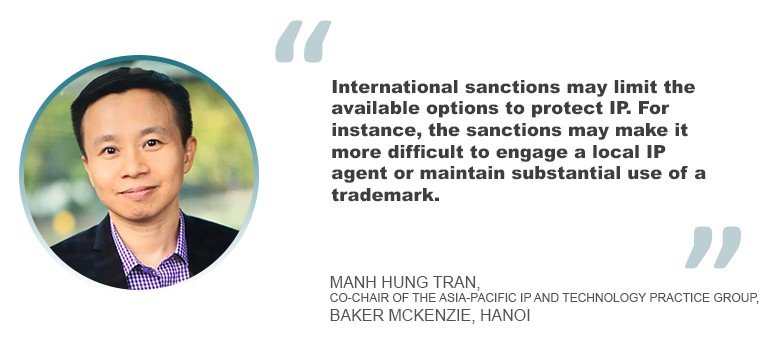Managing IP in a conflict zone
30 April 2024

With business instability and economic turmoil in conflict zones, IP infringement is bound to happen. Excel V. Dyquiangco discusses the proactive measures and strategies to ensure the long-term protection and sustainability of IP assets in conflict zones.
In light of ongoing wars between Russia and Ukraine and between Israel and Hamas, and geopolitical tensions between Azerbaijan and Armenia and between the people of Lebanon and Myanmar and their respective governments, the sustained operation of businesses in these areas faces significant risks due to safety concerns, sanctions and the infringement of branded intellectual property by local criminals. This threat is exemplified by instances such as the emergence of “Stars Coffee” and “Cool Cola” in Russia, respectively mimicking the branding of Starbucks and Coca-Cola, following those companies exiting the market.
As conflict zones continue to disrupt modern business operations, how should companies protect their IP rights amidst safety hazards and geopolitical tensions? What proactive measures can they take to address such IP infringements in conflict zones? What practical measures can they implement to future-proof their IP assets and maintain continuity amidst evolving geopolitical tensions and legal frameworks?
According to Adelaide Yu, principal and general manager at Rouse in Hong Kong, there are two questions all businesses operating in conflict zones must ask themselves: Is there a legal framework for IP prosecution and enforcement? If so, are there effective institutions in place to prosecute and enforce the protection of IP? This varies from country to country and can shape IP strategy.
“In countries like Kosovo, for example, there was no basic legal framework following the war in the late 1990s,” she said. “This resulted in a complete rebuild of the operating judicial system and minimal guidance of the new rule of law. Therefore, the first step is to always establish what the contemporary rule of law is in the conflict zone.”
She added: “Should there be a legal framework, there must be an appropriate institution to enforce these rights. This can be a challenge in conflict zones, as justice institutions tend to become absent from much of the country. In other countries, there might be judicial systems and institutions, but they’re deeply influenced by corruption, elite manipulation, ethnic dominance or simply have insufficient funds to proceed fairly. Once the legal frameworks and institutions available are identified, then companies can strategize and work within these mechanisms to protect their intellectual property rights amidst geopolitical tensions.”
Manh Hung Tran, co-chair of Asia-Pacific IP and Technology Practice Group and head of IP and technology at Baker McKenzie in Hanoi, says it is essential to consider the applicable laws at the conflict zone because IP rights are established and enforced by law, especially local law, given their territorial effect.

“In certain jurisdictions in conflict, seeking IP registration is still possible because the local IP registrars are still operational,” he said. “In addition, the international systems for IP rights establishment, such as under the Berne and Rome Conventions, the Madrid System and the Patent Cooperation Treaty, can be helpful. Albeit not perfectly, these systems do have broad geographical coverage and, in some cases, do not necessarily require the involvement of local IP offices. However, local laws enacted during the conflict may restrict the scope of the established rights, such as what has happened in Russia. Furthermore, international sanctions may also limit the available options to protect IP. For instance, the sanctions may make it more difficult to engage a local IP agent or maintain substantial use of a trademark.”
According to Mudit Kaushik, an advocate at the Delhi High Court, global agreements like the Trade-Related Aspects of Intellectual Property Rights (TRIPS) Agreement and the Paris Convention can also help to uphold basic IP protections. “Businesses must register their IP assets in each operational market to tap into these international protections effectively. These accords establish minimum standards of IP protection that even countries embroiled in conflict have committed to uphold. Businesses should ensure their trademarks, patents and other critical IP are properly registered in each market they operate in, allowing them to invoke these global frameworks to address infringements,” he said.
He added: “Engaging directly with local legal systems and authorities is also essential, even in unstable environments. Businesses should register their IP within the host country and potentially work with local law enforcement to tackle counterfeiting and piracy issues. However, given the potential unreliability of institutions in conflict zones, businesses may need to supplement these efforts with private enforcement strategies, such as employing specialized investigative firms. Additionally, leveraging diplomatic channels, such as the home country’s embassy or trade offices, can sometimes apply pressure or seek intervention in cases of significant infringement when local options prove ineffective.”
Identifying and dealing with IP infringement
With business instability and economic turmoil in conflict zones, IP infringement is bound to happen. To solve this problem, the first thing that businesses should do is to identify which key target market and product site IP infringement is most likely to occur. According to Yu, there are several useful tools that in-house legal counsels are starting to use to identify patterns in IP infringement, specifically in conflict zones.

“As the legal sector is vastly fragmented between industry and jurisdiction, many businesses are not even aware that they may be exposed to a location in the world particularly vulnerable to infringement,” she said. “Case management software, for example, allows teams to get a bird’s eye view of enforcement data, where they can use heat maps to identify hotspots, key infringers and shipment routes to help focus enforcement resources. Teams can also view comparisons of cases and seizures over time to get a better sense of the impact of their brand protection efforts.”
Aside from these tools, conducting thorough risk assessments to evaluate the IP threat landscape across their areas of operation is also a vital method. Kaushik said this involves analyzing factors like political instability, the strength of local legal systems, the prevalence of counterfeiting and historical data on infringement incidents.

“By mapping out high-risk regions and product lines, businesses can focus their limited resources on the most vulnerable areas,” he said. “Given the volatile nature of conflict zones, businesses must also vigilantly monitor shifting geopolitical dynamics and promptly reevaluate priorities as the situation on the ground changes. Establishing strong relationships with in-country partners can provide invaluable local intelligence to help stay ahead of emerging IP threats.”
He added that when resources are constrained, businesses should focus protection efforts on their most valuable and vulnerable assets, such as flagship products or cutting-edge technologies, to have the greatest impact. This strategic prioritization can maximize the effectiveness of IP safeguards in the complex and ever-changing environments of conflict zones.
Determining the optimal timing for enforcing IP rights in conflict zones is also important, requiring a nuanced, risk-based approach that balances the potential benefits and drawbacks of litigation versus negotiation.
“The stability of the local legal and judicial system is a critical consideration,” said Kaushik. “In regions experiencing active conflict or political unrest, the functionality and reliability of courts, law enforcement and administrative bodies may be severely compromised. Pursuing formal legal action during these periods of instability could prove ineffective or even counterproductive if rulings are ignored or local authorities are unwilling or unable to assist. In such circumstances, businesses may be better served by exploring alternative dispute resolution mechanisms or seeking diplomatic interventions through their home country’s trade offices.”
After identifying IP infringement, the next is dealing with it. Yu recommended an in-depth investigation, which can help determine who the main parties involved are in the infringement. This can also aid in establishing where the infringing goods are coming from.
“If the source of the infringing products is located, and it is in a jurisdiction where the brand owner has established its IP rights (and is not in a conflict zone), the brand owner may consider taking action in that jurisdiction,” said Yu. “Depending on the safety and security situation in that area, cease and desist letters are an effective tool in combatting infringements. Many infringers desist from infringing activities (or infringe on other brand owners’ IP rights) if they become aware that a brand owner is actively enforcing its rights.”
Kaushik added that addressing brand impersonation and IP infringement by local criminals or entities in conflict zones requires proactive, multi-faceted strategies. “A foundational step is securing thorough trademark and brand registrations in all pertinent regions, establishing a solid legal groundwork for enforcement actions,” he said. “This provides a strong legal foundation to pursue enforcement actions. Businesses should also closely monitor online marketplaces, social media, and distribution channels for any unauthorized use of their IP and be prepared to act quickly.”
In particularly egregious cases, or when local options prove ineffective, he noted that businesses may need to escalate to diplomatic interventions. “Enlisting the support of their home country’s trade offices or international organizations can help apply pressure and seek resolutions. Public awareness campaigns that educate consumers on the risks of counterfeit goods can also undermine the infringers’ operations and protect the brand's reputation,” he said.
He added: “Ultimately, a proactive, multi-pronged strategy that combines legal, investigative and diplomatic tools is often necessary to swiftly and decisively address brand impersonation in the complex and volatile environments of conflict zones.”
Future-proofing businesses
When it comes to future-proofing their businesses, Tran said that they should constantly monitor the situation in conflict zones to keep themselves updated with any political, economic and legal developments that may affect their IP rights and interests. They should also audit their IP portfolio regularly, as well as enrich it with more IP rights established through international systems.
“Enrichment of the IP portfolio also includes establishing rights (filing for registration, accumulating goodwill) for defensive purposes in even the jurisdiction in which rightsholders have yet to intend to do business,” he said. “For trademark, subject to any sanctions applicable in the conflict zone, the continued use and generation of goodwill of the mark in the concerned market is important. For inventions, if the local patent system does not exist, is too difficult, or offers insufficient protection, rightsholders can consider protecting those inventions as copyright or trade secrets if appropriate.”
Yu added that companies need to proactively prepare for any political or policy eventualities including conflicts and elections, instead of reacting to it.
“Given how much the rule of law can change overnight as we have seen in nations such as Russia or Myanmar, companies should always be prepared for the worst and never be complacent,” she said. “IP lawyers who are preparing a contingency plan will always use a four-step process to assist their clients in the UK. The process includes comprehending the political instability and its impact on the business, collecting information on the factors that have led to this political instability, evaluating the risks and vulnerabilities of the business, and assigning protective measures.”
She pointed out that companies operating in conflict areas can benefit from the help of IP lawyers. Using the United Nations Global Compact Office’s list of activities, she highlighted three categories where IP lawyers can assist businesses in maintaining continuity: risk assessment, international standards and cooperation.
She said: “After a comprehensive evaluation of the needs and risks associated with such operational areas, resolving disputes within communities constructively is a strong starting point. This can be further supported by maintaining a strong standard of international best practices, particularly regarding hiring security professionals. This also includes shunning any provision of funds or assistance to armed groups, avoiding complicity with human rights violators and prohibiting participation in bribery and corrupt actions.”
Lastly, she emphasized the importance of consistent communication and consultation with local communities, asserting that such engagement ensures actions are taken with due consideration for the operating environment. “While this isn’t a one-size-fits-all approach, these measures can collectively contribute to the long-term protection and sustainability of IP continuity in conflict zones,” she said.






